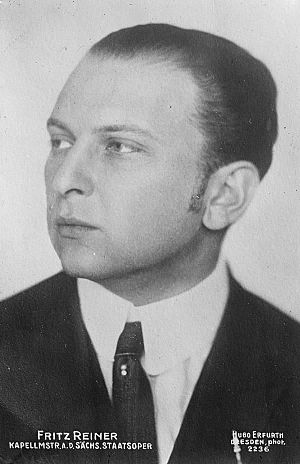Fritz Reiner facts for kids
Fritz Reiner (born December 19, 1888 – died November 15, 1963) was a very important conductor of opera and orchestra music in the 1900s. He was born and trained in Hungary. In 1922, he moved to the United States and became famous for leading many orchestras. His most successful time was when he was the music director of the Chicago Symphony Orchestra from the 1950s to the early 1960s.
Contents
Fritz Reiner's Early Life and Training
Fritz Reiner was born in Budapest, Austria-Hungary in 1888. His family lived in the Pest area of the city. At first, his father wanted him to study law. But Reiner chose to study piano, how to teach piano, and how to write music at the Franz Liszt Academy. For his last two years there, his piano teacher was the young and famous composer Béla Bartók.
Moving to the United States
Reiner started his career conducting at opera houses in Budapest and Dresden. He worked closely with the composer Richard Strauss during this time. In 1922, he moved to the United States. He became the main conductor of the Cincinnati Symphony Orchestra and stayed there until 1931.
In 1928, he became a citizen of the United States. He also started teaching at the Curtis Institute in Philadelphia. Some of his students became very famous, like Leonard Bernstein and Lukas Foss.
Leading Major Orchestras
From 1938 to 1948, Reiner conducted the Pittsburgh Symphony Orchestra. He also made some recordings with them. After that, he spent several years at the Metropolitan Opera in New York.
At the Met, he conducted a famous show of Strauss's Salome in 1949. He also led the first American performance of Igor Stravinsky's The Rake's Progress in 1951. In 1952, he conducted and recorded Bizet's opera Carmen, which starred Rise Stevens. This performance was even shown on special television screens.
Reiner also appeared in the 1947 film Carnegie Hall. In the movie, he conducted the New York Philharmonic as they played with the famous violinist Jascha Heifetz. Ten years later, Reiner and Heifetz recorded the full Tchaikovsky violin concerto together.
Height of His Career in Chicago
After World War II, Reiner started working more in Europe. By the time he became the music director of the Chicago Symphony Orchestra in 1953, he was known all over the world.
Many people agree that the ten years Reiner spent in Chicago were the best part of his career. He made many famous recordings there for RCA Victor from 1954 to 1963. His first recording in Chicago was of Ein Heldenleben by Richard Strauss. This was one of the first recordings RCA made using stereophonic sound. His last concerts in Chicago were in the spring of 1963.
One of his last recordings was Brahms's Symphony No. 4. He recorded it with the Royal Philharmonic Orchestra in London in 1962.
Reiner also appeared on television with members of the Chicago Symphony. These shows were called Music From Chicago. The videos show his serious and disciplined way of conducting. But at the end of a piece, he would often turn to the audience and smile as he bowed.
Fritz Reiner's Personal Life
Fritz Reiner was married three times and had three daughters. His health became worse after he had a heart attack in October 1960. He passed away in New York City on November 15, 1963, when he was 74 years old.
Repertoire and Conducting Style
Reiner was especially known for performing music by Richard Strauss and Bartók. Many people thought he liked modern music. He and his friend Joseph Szigeti even convinced Serge Koussevitzky to ask Bartók to write his Concerto for Orchestra. However, Reiner actually knew a very wide range of music and loved Mozart's music the most.
Reiner's conducting style was known for being very precise and clear. He used very small movements with his baton. People said the tip of his baton could stay within the size of a postage stamp! Even with these small movements, the orchestras he led played with amazing richness, brightness, and clarity.
Igor Stravinsky said the Chicago Symphony under Reiner was "the most precise and flexible orchestra in the world." Reiner had very high standards for his musicians. Trumpeter Adolph Herseth said that Reiner often challenged him and other musicians to play their best.
See also
 In Spanish: Fritz Reiner para niños
In Spanish: Fritz Reiner para niños
 | Selma Burke |
 | Pauline Powell Burns |
 | Frederick J. Brown |
 | Robert Blackburn |


